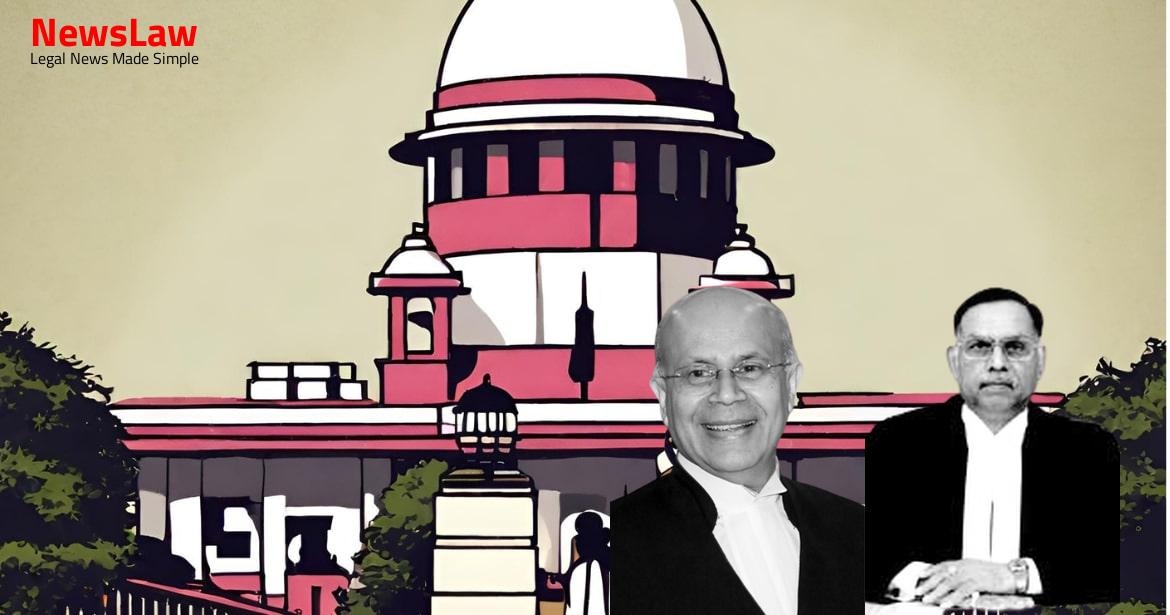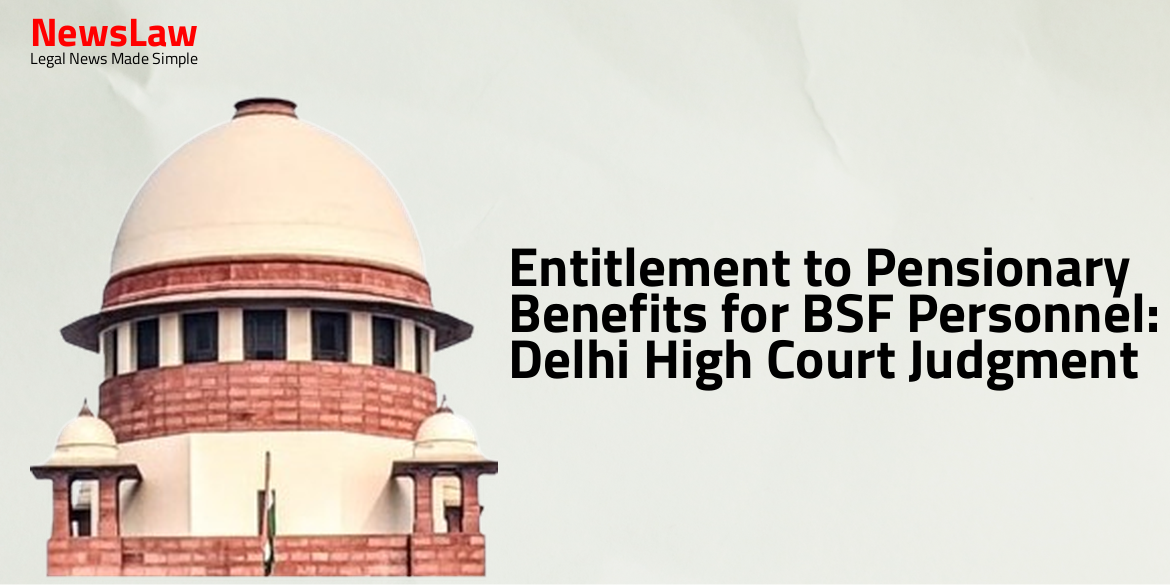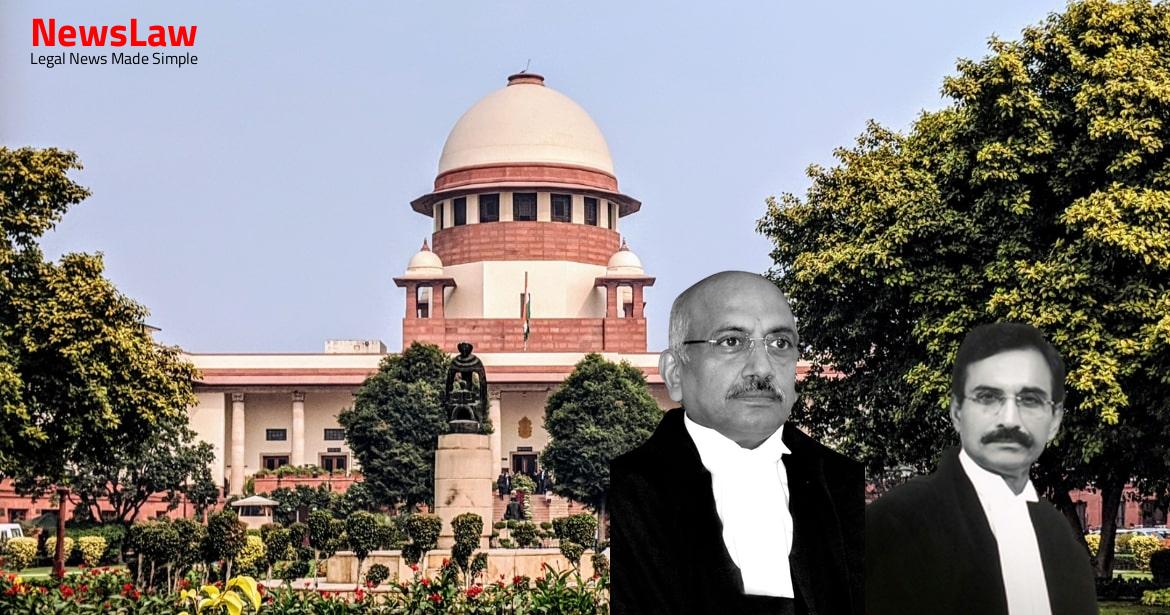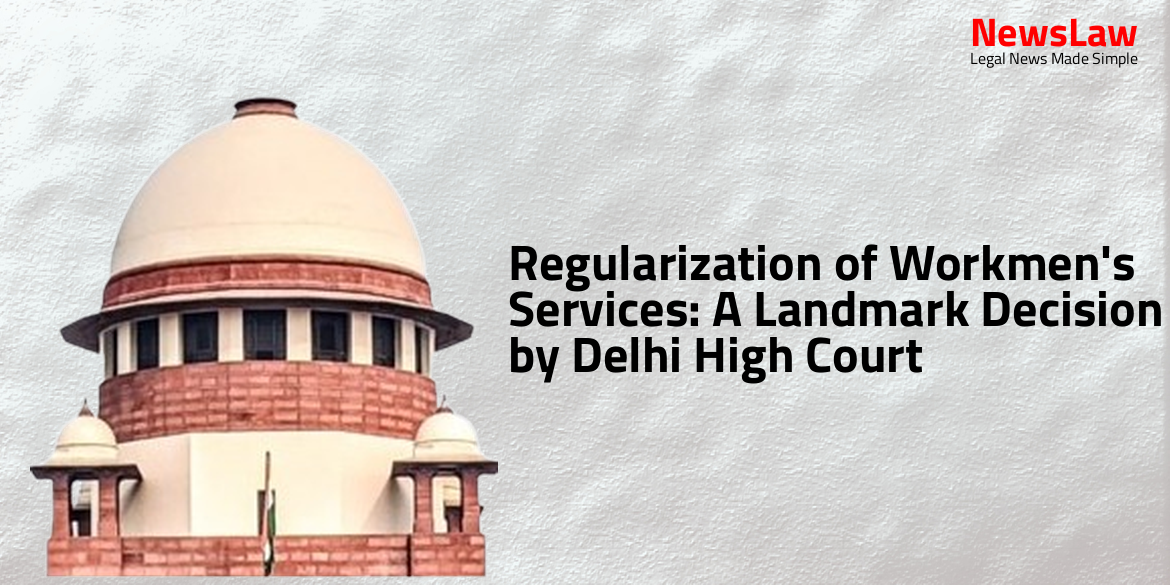The legal battle between Afsar Begum and the Appellant over the protected tenant status has finally reached a conclusion after years of litigation. The case involves challenges to the issuance procedure of a certificate and the rights of the protected tenant under Section 38E(1) of the Act. It underscores the significance of honoring final judgments by competent courts and the rule of law in preventing individuals from being subjected to multiple rounds of litigation on the same matter.
Facts
- The Deputy Collector rejected the statutory certificate on 19.04.1971
- The Maharashtra Revenue Tribunal affirmed the rejection on 09.11.1971
- Regular Civil Suit No.73/1972 was filed by the respondents for declaration of title
- The certificate issued to the appellant’s predecessor was challenged in the suit
- The suit was initially decreed but later reversed by the Extra Assistant Judge in appeal
- The appellant’s predecessor was granted statutory tenant status under Section 38E(1) of the Act
- The challenge to the certificate issuance procedure was rejected in appeal
- Nadimuddin, the original land owner, did not challenge the rejection until his death
- The legal heirs of Nadimuddin filed a fresh challenge to the certificate after his death
- Afsar Begum, wife of Nadimuddin, filed an appeal in May 1981 challenging the certificate for Survey No.202/AA
- The suit dismissal became final as the legal heirs did not challenge it in a superior forum
- The Deputy Collector remanded the matter to the Additional Tehsildar on 20.01.1983
- Nadimuddin’s application for resuming lands for personal cultivation was filed under Section 44 of the Act
- The Additional Tehsildar in 1987 held that due to lack of proper entries in the tenants register, the predecessor of the appellant could not be recognized as a protected tenant.
- Afsar Begum filed a revision against this decision, which was approved by the Tribunal in 1990, supported by the Single Judge and the Division Bench.
- Shri Vinay Navare argued that the status of the appellant as a protected tenant was established by the Tribunal’s order in 1971 and the dismissal of Civil Suit No 73/1972, thus, Afsar Begum, who was the wife of the deceased, could not contest this status years later.
- The Deputy Collector, in the appellant’s appeal, on 30.12.1988, overturned the Additional Tehsildar’s decision and affirmed the appellant’s declaration of ownership rights under Section 38E(1) of the Act.
- Even if the Tribunal’s 1971 order was deemed incorrect, since it was final, the Tribunal could not reverse its earlier decision on appeal.
- The appellant should not be subjected to repeated challenges on the same matter, first by the sons of Nadimuddin and later by his wife Afsar Begum.
Also Read: Interpretation of Lease Agreement and Compulsory Registration
Arguments
- The impugned order indirectly provides what was originally denied to the respondents through litigation.
- The dismissed appeal by the respondents as legal heirs of Nadimuddin is final and on merits despite being dismissed on limitation grounds.
- Counsel for the respondents argued that the Tribunal’s order dated 21.09.1990, upheld by the High Court, is well-reasoned and considered.
- The certificate holder has since passed away and the respondents have been substituted in place.
- Appellant’s certificate was erroneously issued
- Tribunal had the authority to correct the wrong
- The certificate was not properly obtained
- Issuance procedures were not followed
Also Read: Enhancing Compensation and Modifying Sentences: A Legal Analysis
Analysis
- The Land Tribunal had granted a composite certificate as a protected tenant to the appellant for both Survey Nos. 189 and 202/AA.
- The respondents do not dispute the appellant’s status as a tenant.
- The appellant’s claim that the certificate was issued behind Nadimuddin’s back is contradicted by Nadimuddin’s application for resumption of the lands, which was rejected in 1960.
- The High Court’s conclusion that the certificate was ‘fictitious, unfounded and useless’ is deemed unsustainable.
- Errors in the tenancy register were cited as a reason for questioning the appellant’s protected tenant status, despite earlier rulings confirming the status.
- The certification under Section 38E(2) grants the protected tenant ownership rights over the land.
- Challenges to the appellant’s status primarily arose following new appeals by the widow of the deceased, leading to the revisiting of the earlier orders.
- The respondents did not challenge the dismissal of their suit, allowing the earlier orders to gain finality.
- Attempts at restoration of the lands for personal cultivation by Nadimuddin were rejected in 1960 and not contested until his demise in 1962.
- The appellant’s protected tenant status remains valid unless obtained through fraud or misrepresentation, which was not alleged by the respondents.
- Reopening of the ownership rights declaration in favor of the appellant was deemed impermissible by the Deputy Collector.
- Multiple rounds of litigation by the sons of the landowner and later by his widow have subjected the appellant to repeated vexations.
- The procedural defect in the tenancy register regarding the appellant’s name formed a basis for challenging the protected tenant status.
- The lack of separation between the widow and her sons casts doubt on the widow’s claim of being uninformed about relevant facts.
- The order of the Additional Tehsildar citing procedural defects was considered in subsequent appeals by the Deputy Collector.
- Within 90 days of receiving a notification, every landholder must file an application before the Tribunal to determine the reasonable price of land transferred to a protected tenant.
- If an application is not filed within the specified period but a certificate has been issued, the Tribunal can proceed to determine the price.
- Provisions of subsections (4) to (9) of section 38 apply mutatis mutandis in such cases.
- Respondents appealed, claiming the landholder was sick and unable to challenge the declaration in time.
- The Deputy Collector found no evidence of illness that prevented the landholder from pursuing remedies, as seen from the rejected application under Section 44 in 1960.
- Law favors finality to binding judicial decisions pronounced by competent courts.
- Public interest is against individuals being subjected to repeated litigation on the same matter.
- The binding nature of judgments by competent courts is crucial for the rule of law.
- Dismissal of an appeal on grounds like limitation can also signify a final decision on the merits.
- Even erroneous decisions on points of law can operate as ‘res judicata’ between parties.
- The binding nature of judgments by competent courts is essential for the administration of justice.
- Errors in judgments can only be superseded by appeals to higher tribunals.
Also Read: SPML Infra Limited vs. Govt. of Arunachal Pradesh
Decision
- The appeal is allowed.
- The decision of the lower court is set aside.
- The case is remitted back to the lower court for further proceedings.
- Costs are to be awarded to the appellant.
Case Title: VAIJINATH S/O YESHWANTA JADHAV DECEASED BY L.RS. Vs. AFSAR BEGUM W/O NAIDIMUDDIN DECEASED BY L.RS. (2020 INSC 113)
Case Number: C.A. No.-000652-000652 / 2020



